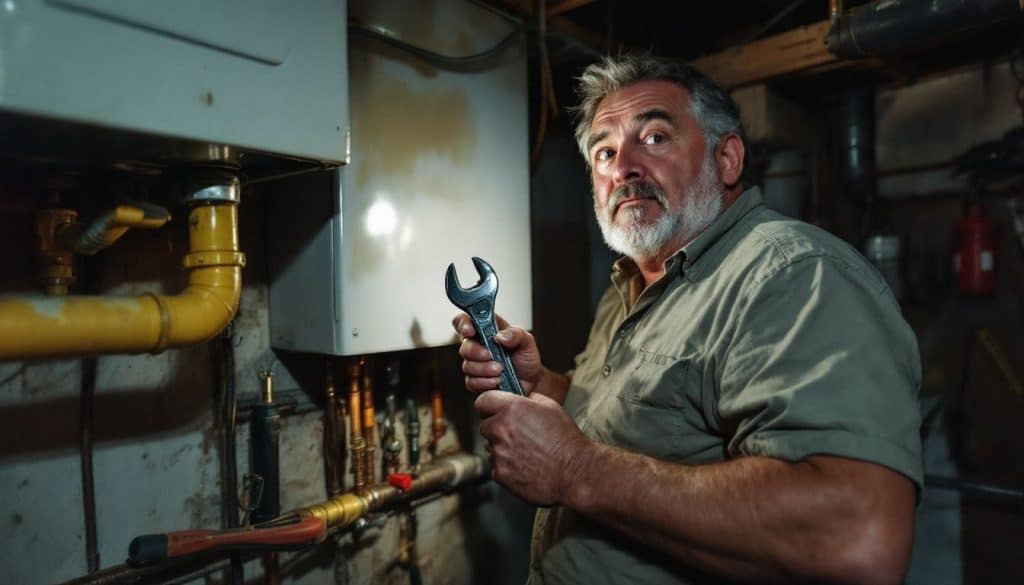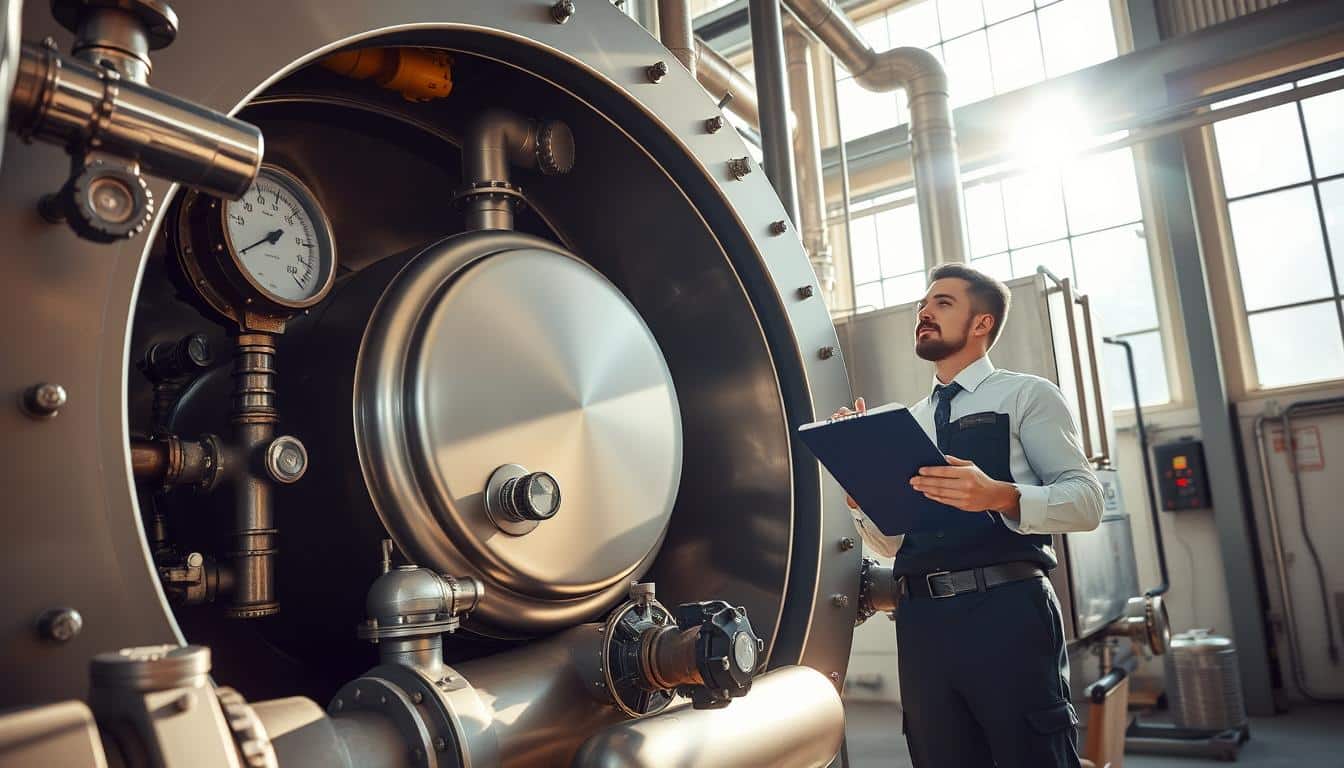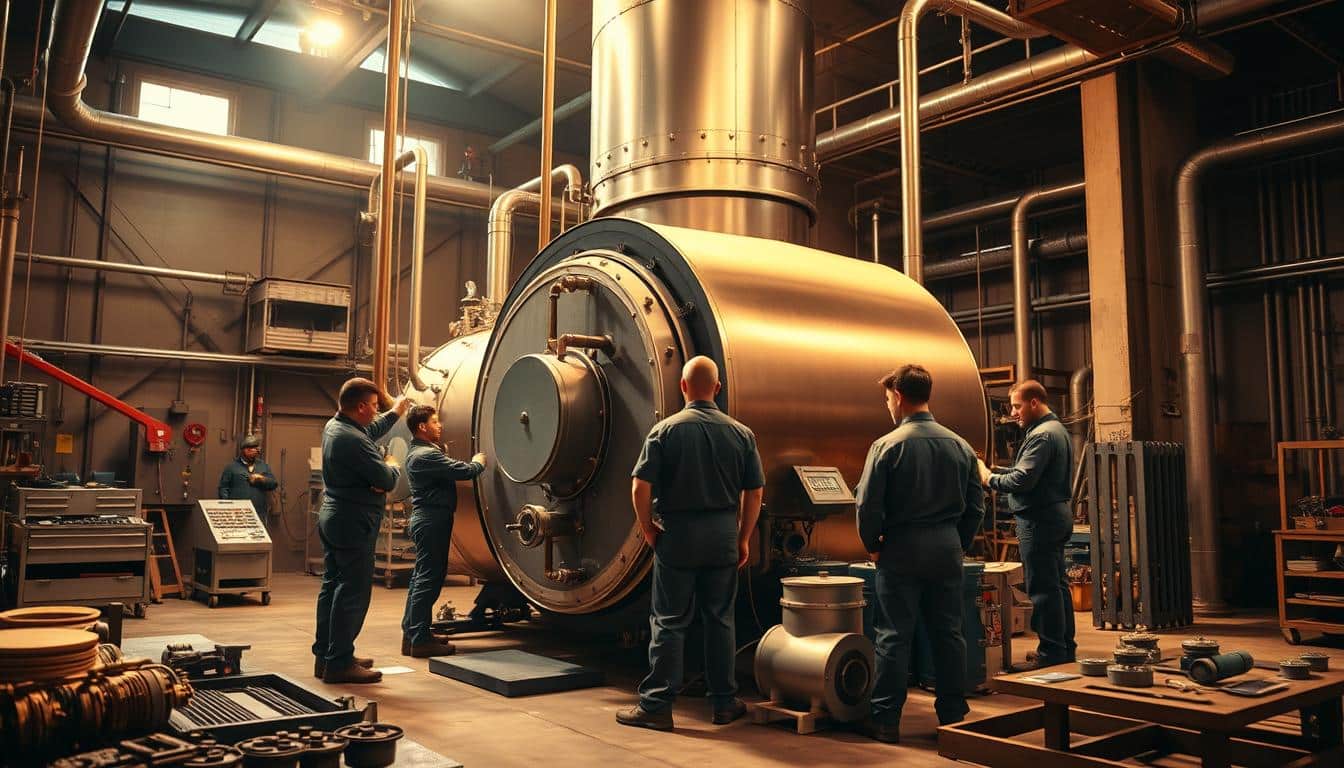Table of Contents
Ever wondered can I repair my boiler myself? Maybe you’ve noticed no heat or strange noises coming from it. You’re not alone in this thought.
Many homeowners face boiler problems every few years. After researching, we found some DIY tips that can save you time and money.
Our guide will help you with common issues like low pressure and leaks. We’ll show you how to do simple repairs without needing a degree. We’ll also tell you when it’s time to call a professional.
So, are you ready to tackle these problems yourself? Let’s get started!
Key Takeaways
- You can fix some boiler problems at home like no heat, leaks, or strange noises. Follow guides and use the right tools.
- Safety first. Turn off your boiler before any DIY repair. Use gloves and goggles for protection.
- Some issues need a professional, like big leaks or electrical problems. Call for help when needed. Companies like Raye-Van Enterprises Inc. is the key.
- Regular checks on your boiler prevent bigger problems later. Look for leaks and check pressure.
- Learn the basics of your boiler system to make simple repairs easier. This saves money and keeps your home warm.
Common Boiler Problems and DIY Solutions
Boilers can have various problems that we can fix ourselves. We will look at some common issues and simple ways to solve them.
No heat or hot water
Issues with no heat or hot water are common. A broken thermostat is often the cause. If it doesn’t work, the boiler won’t turn on.
Another reason could be an empty fuel tank. We should check if we have enough fuel first. Next, check the pilot light. If it’s out, we need to relight it following the manufacturer’s instructions.
Fixing these problems ourselves can save us money and keep our homes warm.
Leaking and dripping
Leaking and dripping are common boiler issues. They can cause water damage and higher bills. First, we should find the source of the leak. It might come from the pipes or valves.
Tightening these connections could solve the problem.
If we notice a drip from the pressure relief valve, it may mean our boiler has high pressure. We need to check the boiler pressure gauge. Adjusting it might stop the leak. Sometimes, seals wear out and need replacing to fix leaks properly.
Regular maintenance helps us catch these issues early in our DIY boiler repairs.
Pilot light going out
The pilot light going out can stop our boiler from working. This problem often happens because of a draft or dust buildup. To fix it, we first need to turn off the gas supply. We then clean the area around the pilot light and relight it according to the manufacturer’s instructions.
If our pilot light keeps going out, we may need to check for a faulty thermocouple or other issues. It is smart to call a professional if we cannot solve this ourselves. Understanding boiler troubleshooting helps us keep our homes warm and comfortable during colder months.
Kettling (strange noises)
Kettling is when our boiler makes odd sounds, like boiling water. It often means there’s too much pressure or limescale buildup around the heat exchanger.
If we hear these sounds, we should first check the boiler pressure.
Low water levels can also cause kettling. We need to add more water if needed. Cleaning out any limescale will help too. Simple DIY maintenance can often fix this issue before it gets worse.
Low boiler pressure
Low boiler pressure can cause problems in our heating system. We may notice that the radiators are not getting hot or there is no heat or hot water. This issue often happens when water leaks from the system or if we have recently added new radiators.
Checking the pressure gauge is a simple step we can take to identify this problem.
To fix low boiler pressure, we can try to add water to the system. Usually, we do this by using a filling loop on our combi boiler. It’s important to refer to the manual for specific steps.
If low pressure keeps happening, it might be time for professional help with home boiler repair. Regular checks and DIY maintenance tips can help us avoid future issues with boiler maintenance and keep everything running smoothly.
Radiators not heating up
Radiators not heating up is a common problem we can face. First, we should check the radiator valves. Make sure they are open. Often, air gets trapped inside the radiators. We can bleed the radiator to release this air.
We need a radiator key for this task.
Next, let’s look at the boiler pressure. If it is too low, our radiators won’t work well. We can adjust the boiler pressure ourselves using the filling loop on our system. Also, verifying that the thermostat settings are correct helps in keeping our home warm.
These simple steps will help us with DIY hot water boiler repair and improve heating in our space.
Boiler switching off
Boilers can switch off for many reasons. A common issue is a low water level. If the water level drops too much, the boiler will stop working to avoid damage. Another reason might be a faulty thermostat.
A broken thermostat can’t read temperature properly and can cause the system to turn off.
We should also check if there are any blockages in the flue or air supply. Blockages can lead to safety issues, prompting the boiler to shut down. Regular checks help us catch these problems early and keep our heating system running smoothly.
Frozen condensate pipe
A frozen condensate pipe can stop your boiler from working. It usually happens in cold weather when water inside the pipe freezes. We may notice this issue when our heating system stops, or we see an error code on the display.
To fix a frozen condensate pipe, we can try to thaw it. We can use warm water or a heat source like a hair dryer. Be careful not to apply too much heat at once. This process helps restoreour heating system and brings back hot water quickly.
Homeowners should check this problem regularly, DIY boiler maintenance is key, especialy during winter months.
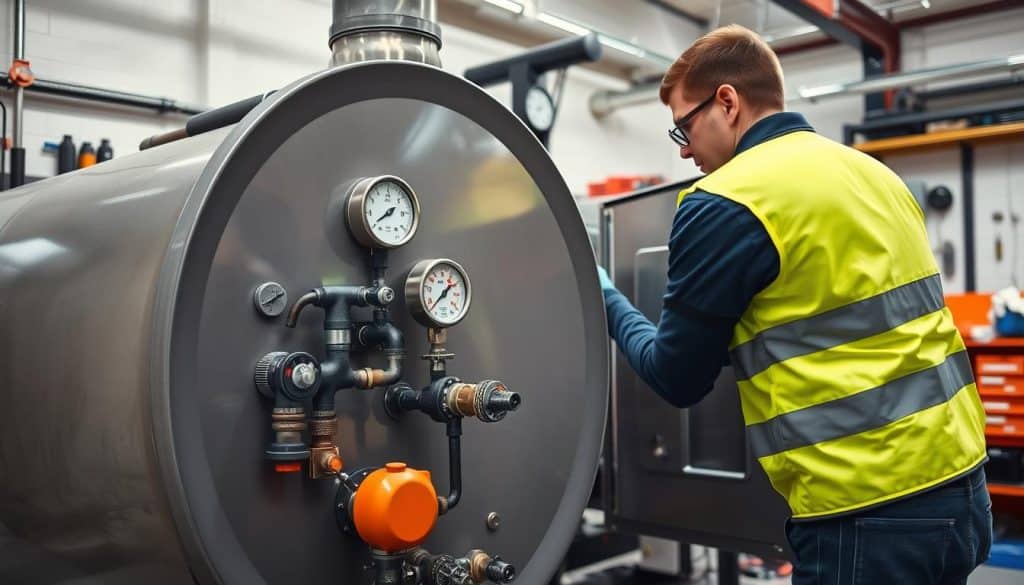
When to Seek Professional Help
Some boiler problems need a pro’s help. If we see major leaks or strange noises, it’s time to call for help. Raye-Van Enterprises Inc. is the best choice. They ensure the job is done right.
For complex repairs like electrical problems, a professional is needed. DIY fixes might not work. It’s safer to let experts handle big fixes to keep everything running smoothly.
DIY Boiler Maintenance Tips
Regular checks keep your boiler in good shape. We can look for leaks and clean out dirt to avoid big problems later.
Checking for leaks, buildup, and sediment
We can easily check our boiler for leaks, buildup, and sediment. Look around the pipes and connections for any water or damp spots. Catching a leak early helps us avoid bigger problems later.
Next, we should clean out any buildup or sediment inside the boiler. This gunk can block parts of the system and cause it to work less efficiently. Regular cleaning keeps our heating system running smoothly and saves on energy costs.
Taking these steps is part of good home boiler maintenance for homeowners like us.
Inspecting the fuel system
Inspecting the fuel system is a key part of our boiler maintenance. We should check for any leaks or damage in the fuel lines. A leak can cause safety risks and waste energy. We also need to look at the fuel filter and replace it if it’s dirty.
This will help our boiler run better.
Checking these parts can save us money on repairs later. Keeping our fuel system in good shape means we have heat when we need it most. Let’s take time to inspect this area regularly as part of our home boiler repair tips.
Examining electrical switches and wiring
We need to check the electrical switches and wiring in our boiler. Faulty connections can cause a lot of problems. First, we look for any loose wires or damaged insulation. These issues can stop our boiler from working properly.
Next, we should test the electrical switches. A broken switch may prevent power from reaching the boiler. If we find issues, repairing them quickly is vital for safe operation. Taking care of these checks will help us understand our home boiler better and ensure it runs smoothly.
DIY Boiler Installation and Repair Guide
DIY Boiler Installation and Repair Guide: This section helps us understand how to fix common boiler issues ourselves while keeping safety in mind. We can start learning about the steps we need to take for heating system repairs now!
Understanding boiler repairs
We need to understand boiler repairs to keep our homes warm. Boilers can face many issues, like not heating water or making strange noises. Knowing how our systems work helps us handle some problems ourselves.
We should also know the signs that mean it is time for a professional.
Understanding boiler repairs includes knowing what parts are involved. A boiler often has pipes, valves, and switches. Each part plays a role in making it run smoothly. Familiarity with these components makes DIY repairs easier.
We can save money by fixing small problems before they become big ones. This knowledge will guide us as we take care of our boilers at home or in our business spaces.
Steps for heating system repairs
Heating system repairs can seem hard. We can tackle these issues together.
- Turn off the Boiler: Safety first. Stop the boiler and wait for it to cool down before starting any repair.
- Check the User Manual: Every boiler has a manual. It guides us through repairs and helps us understand our specific model.
- Identify the Problem: Look for signs like leaks or strange noises. Understanding the issue helps us find a solution faster.
- Inspect the Pressure Gauge: Check if the pressure is too low or high. A good range is usually between 1 and 1.5 bar for most boilers.
- Bleed Radiators: Use a radiator key to open the valve at the top of each radiator. This releases trapped air, helping them heat up properly again.
- Check for Leaks: Look around pipes and joints for water spots or dampness. Tightening fittings might solve small leaks right away.
- Clean Components: Dust or dirt can block parts of our heating systems. Cleaning these areas can improve performance, specially in filters and vents.
- Inspect Electrical Connections: Ensure all wires are secure and not frayed or damaged. Faulty wiring can cause many problems, including power loss to our boiler.
- Test Thermostat Settings: Verify that our thermostat is set correctly and functioning well. An incorrect setting may cause heating issues in our home.
- Restart the System: After making repairs, turn the boiler back on and monitor its performance closely over a few days to ensure everything works well.
Taking these steps for DIY heating system repairs helps us save money while keeping our homes warm and cozy.
Troubleshooting common issues
Troubleshooting common boiler issues can help us save money. We can often fix small problems without calling a repairman.
- No heat or hot water: Check the thermostat first. Make sure it is set to a higher temperature. If it is cold, check the boiler pressure. It should be between 1 and 2 bar.
- Leaking and dripping: Look for any visible leaks on the pipes or the boiler itself. If we find a leak, we may need to tighten joints or replace seals.
- Pilot light going out: If the pilot light goes out, relight it following the instructions on our boiler’s manual. Ensure the gas supply is on.
- Kettling (strange noises): If we hear strange sounds like banging or gurgling, this can mean there’s limescale buildup in the heat exchanger. Flushing the system might clear this up.
- Low boiler pressure: Low pressure can stop our heating system from working properly. We can increase it by using the filling loop valve until it reaches 1-2 bar.
- Radiators not heating up: Cold spots in radiators usually mean they need bleeding to release trapped air. Turn off your heating, then use a radiator key to open the bleed valve at the top until water comes out.
- Boiler switching off: A boiler that keeps shutting down could mean it’s overheating or there’s an issue with safety devices. Checking for blockages in vents and filters might solve this problem.
- Frozen condensate pipe: During winter, pipes can freeze and stop water flow. Thawing them gently with warm cloths can restore function safely.
Using this DIY troubleshooting guide helps us keep our boilers running smoothly without extra costs for repairs!
Essential safety precautions
Safety is our top priority when we work on boiler repairs. We must turn off the power to the boiler before starting any DIY tasks. This helps us avoid electric shocks. It’s also wise to let the system cool down if it has been running hot.
Always use protective gear like gloves and goggles. These items keep us safe from sharp parts and hot surfaces. If we smell gas or see a leak, we should leave the area right away and call for help.
Following these safety steps makes our repair process safer and more efficient as homeowners who take care of their own boilers.
DIY vs professional repairs
Choosing between DIY and professional repairs for your boiler can save time and money. We look at safety, cost, and skill level. Here’s a comparison.
| Factor | DIY Repairs | Professional Repairs |
|---|---|---|
| Safety | High risk. Mistakes can lead to accidents. | Safe. Experts know how to handle risks. |
| Cost | Lower upfront. But mistakes are costly. | Higher upfront. Long-term savings. |
| Skills Needed | Basic. Limited to simple tasks. | High. Trained for complex issues. |
| Time | Varies. Depends on your ability. | Faster. Experience speeds up repair. |
| Warranty | None. You bear the cost of errors. | Often included. Protects your investment. |
| Outcome | Uncertain. Depends on your skill. | Guaranteed. Backed by professional standards. |
We recommend evaluating each factor carefully. Your choice affects your boiler’s safety, efficiency, and lifespan.
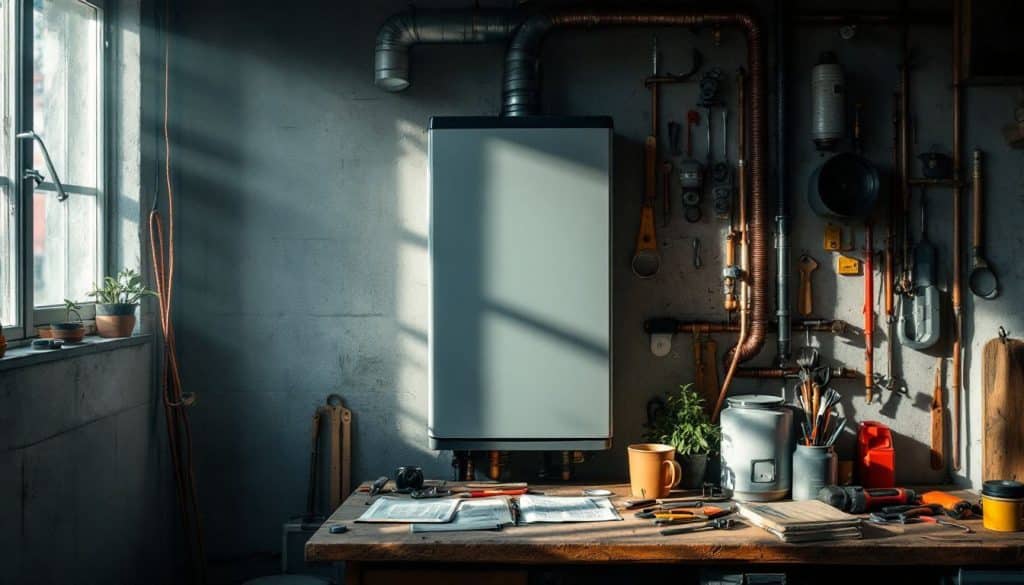
Conclusion
We talked a lot about fixing boilers ourselves. We covered issues like leaks and low pressure. Many of these problems have simple fixes we can do at home. Taking care of our boiler saves time and money.
For more help, check local guides or videos online. Small steps can make a big difference in our homes. Let’s take charge and keep our boilers running smoothly!
FAQs
Can I repair my boiler myself?
Yes, you can fix your boiler yourself with the right tools and knowledge from a reliable home boiler troubleshooting guide.
How much does it cost to have a professional install or replace my boiler?
Boiler installation cost varies depending on your location and the complexity of the job. It’s often more expensive than doing it yourself.
What are some common issues that I might face with my boiler?
Common problems include needing to adjust the boiler pressure and other issues. These can be solved by following a detailed DIY water heater maintenance guide.
If I can’t fix it myself, what should I expect as an average repair cost for my boiler?
The exact costs for professional help vary widely based on problem severity. You can compare these costs against the expenses of a full replacement.

